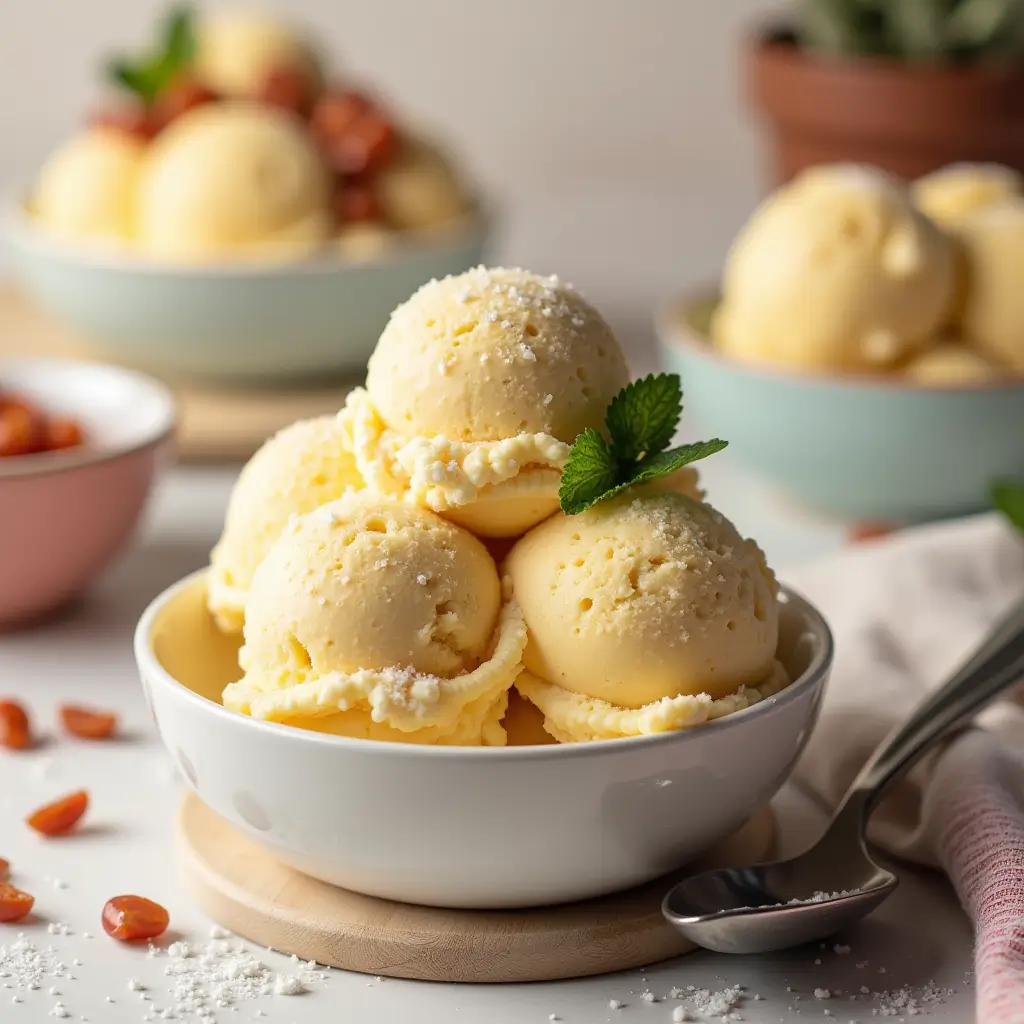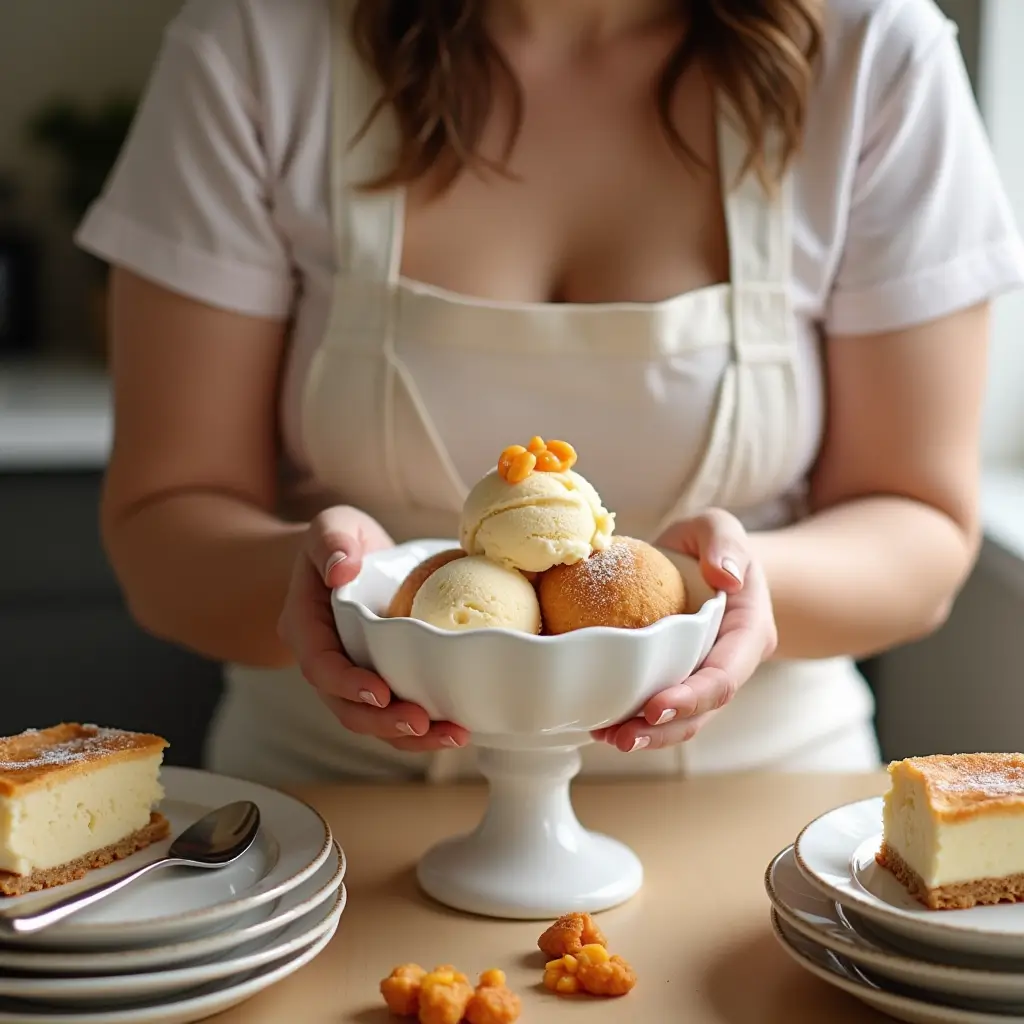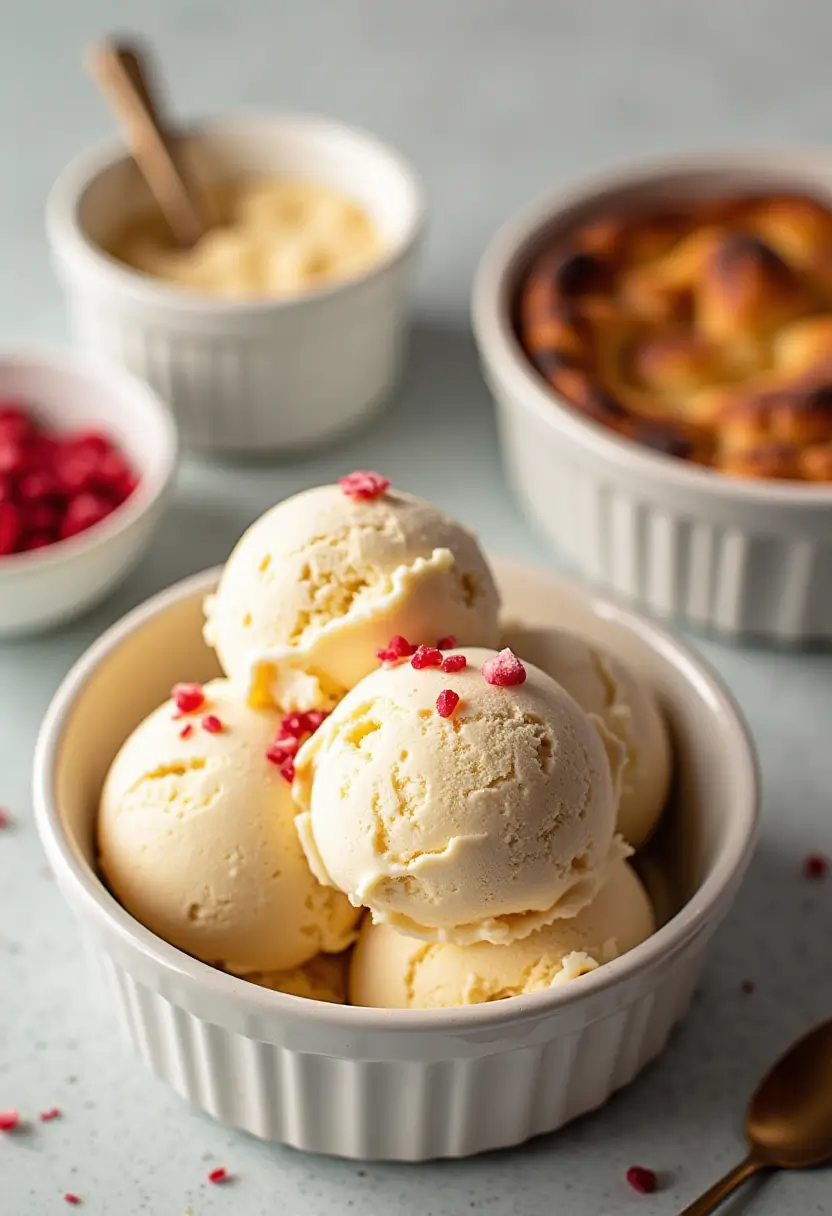kitchenaid ice cream recipes
Table of Contents
Kitchenaid ice cream recipes :
Discover how to create restaurant-quality ice cream at home with your KitchenAid mixer – from perfect bases to troubleshooting tips that guarantee success every time.
If you’ve ever wondered why your homemade ice cream doesn’t quite match that creamy, dreamy texture from your favorite ice cream shop, you’re about to discover the secret weapon hiding in your kitchen cabinet. Your KitchenAid mixer, paired with its ice cream attachment, is capable of producing kitchenaid ice cream recipes that rival any artisan gelato or premium brand you’ve ever tasted.
Whether you’re a complete beginner looking for your first kitchenaid ice cream recipe or an experienced home cook seeking to perfect your technique, this comprehensive guide will transform you into an ice cream master. We’ll cover everything from the science behind perfect texture to troubleshooting common problems, plus share professional-level tips that most home cooks never discover.
Why Your KitchenAid is Your Secret Ice Cream Weapon
Your KitchenAid stand mixer isn’t just for bread and cookies – it’s actually one of the most effective tools for creating exceptional homemade ice cream. Unlike no-churn methods that can result in icy textures, or expensive standalone machines that take up precious counter space, the KitchenAid ice cream attachment leverages the power and precision of your existing mixer.
Here’s what makes ice cream recipes for kitchenaid so special:
- Consistent churning power: Your mixer’s motor provides steady, reliable agitation that incorporates air perfectly
- Temperature control: The pre-frozen bowl maintains optimal freezing temperatures throughout the process
- Versatility: Switch from churning ice cream to making the custard base with the same machine
- Space efficiency: No need for additional appliances cluttering your kitchen
- Cost effectiveness: Professional results without the premium price tag
Understanding Your KitchenAid Ice Cream Attachment
Different Models and Compatibility
Most KitchenAid ice cream makers are compatible across different mixer models, but it’s essential to verify compatibility with your specific stand mixer. The standard 2-quart ice cream bowl attachment (model KICA0WH) works with most tilt-head and bowl-lift mixers manufactured after 2000.
The Science Behind the Magic
Your KitchenAid ice cream attachment works through a simple yet brilliant mechanism:
- Pre-frozen bowl: Contains a special gel that freezes solid, maintaining temperatures below 32°F
- Dasher paddle: Scrapes the bowl sides while churning, preventing large ice crystals
- Motor power: Provides consistent agitation that incorporates air and creates smooth texture
Crucial Pre-Freezing Protocol
This is where most home cooks fail – and it’s the difference between success and disappointment.
The 24-Hour Rule: Your bowl must freeze for a minimum of 24 hours. Here’s the pro approach:
| Timeframe | Action | Why It Matters |
|---|---|---|
| 24+ hours before | Place bowl in deepest part of freezer | Ensures complete gel freezing |
| 2 hours before | Remove base from refrigerator | Allows proper chilling temperature |
| Just before churning | Test bowl with water drops | Drops should freeze instantly |
Troubleshooting Cold Bowl Issues:
- If water drops don’t freeze immediately, extend freezing time
- Freezer temperature should be 0°F or below
- Don’t store bowl near freezer door where temperature fluctuates
- Keep bowl in freezer between uses for spontaneous ice cream making
The Anatomy of Perfect Homemade Ice Cream (KitchenAid Edition)
Understanding the science behind ice cream will elevate your ice cream recipe with kitchenaid mixer from good to extraordinary.
Fat Content: The Texture Foundation
Fat creates the rich, smooth texture we crave in premium ice cream. Different dairy options provide varying fat levels:
- Heavy cream (36% fat): Creates the richest, most luxurious texture
- Half-and-half (12% fat): Lighter option, still creamy
- Whole milk (3.5% fat): Base for lighter ice creams and sorbets
- Alternative milks: Coconut milk (20% fat) works best for dairy-free options
Pro Tip: Combine different dairy products to achieve your preferred richness level. A 2:1 ratio of heavy cream to whole milk creates restaurant-quality texture.
Sugar: Beyond Sweetness
Sugar doesn’t just add sweetness – it’s crucial for texture and freezing properties:
- Granulated sugar: Standard choice, dissolves easily
- Brown sugar: Adds molasses notes and slight chewiness
- Honey/maple syrup: Liquid sweeteners prevent ice crystals but use 25% less than granulated sugar
- Artificial sweeteners: Can create icy textures; blend with small amounts of regular sugar
Stabilizers: The Secret to Professional Results
Professional ice cream makers use stabilizers to prevent ice crystals and improve texture:
Egg yolks (French-style custard base):
- Creates silky, rich texture
- Acts as natural emulsifier
- Requires cooking to 170°F for safety
Cornstarch (2 tablespoons per quart):
- Easier than eggs, no cooking required
- Prevents ice crystals effectively
- Mix with small amount of milk before adding
Xanthan gum (1/8 teaspoon per quart):
- Professional-grade results
- Prevents ice crystal formation
- Blend thoroughly to avoid clumping
Air Incorporation: The KitchenAid Advantage
Your KitchenAid’s dasher incorporates air perfectly, creating what professionals call “overrun” – the increase in volume from air incorporation. Proper churning increases volume by 50-100%, creating light, scoopable texture.
Master KitchenAid Ice Cream Base Recipes
The Perfect Vanilla Bean Custard Base (French Style)
Serves: 6-8 | Prep time: 30 minutes | Chill time: 4 hours | Churn time: 20 minutes
Ingredients:
- 2 cups heavy cream
- 1 cup whole milk
- 3/4 cup granulated sugar, divided
- 6 large egg yolks
- 1 vanilla bean (or 2 teaspoons pure vanilla extract)
- Pinch of salt


Instructions:
- Prepare the vanilla: Split vanilla bean lengthwise, scrape seeds into cream mixture
- Heat dairy: Combine cream, milk, and half the sugar in heavy-bottomed saucepan
- Warm gradually: Heat until steam rises and tiny bubbles form around edges (don’t boil)
- Prepare egg mixture: Whisk egg yolks with remaining sugar until pale yellow
- Temper eggs: Slowly add 1/2 cup hot cream mixture to eggs, whisking constantly
- Combine: Pour tempered egg mixture back into saucepan
- Cook custard: Stir constantly until mixture coats spoon (170°F on thermometer)
- Strain: Pour through fine-mesh strainer to remove any lumps
- Chill completely: Refrigerate 4+ hours or overnight
The Easiest Sweet Cream Base (Philadelphia Style)
Perfect for beginners and quick satisfaction
Ingredients:
- 2 cups heavy cream
- 1 cup whole milk
- 3/4 cup sugar
- 1 teaspoon vanilla extract
- 1/4 teaspoon salt
- 2 tablespoons cornstarch
Instructions:
- Mix dry ingredients: Whisk sugar, salt, and cornstarch
- Combine: Add milk gradually, whisking until smooth
- Add cream and vanilla: Stir until sugar completely dissolves
- Chill: Refrigerate 2+ hours before churning
Versatile Vegan Coconut Base
Dairy-free doesn’t mean flavor-free
Ingredients:
- 1 can (14 oz) full-fat coconut milk
- 1 cup cashew cream (1 cup cashews soaked 4 hours, blended with 1 cup water)
- 2/3 cup sugar
- 1 teaspoon vanilla extract
- 1/4 teaspoon salt
- 1 tablespoon cornstarch
Instructions:
- Blend cashew cream: Soak cashews 4 hours, drain, blend with fresh water until smooth
- Combine all ingredients: Whisk until sugar dissolves completely
- Strain: Pour through fine-mesh strainer for ultra-smooth texture
- Chill: Refrigerate 4+ hours before churning
Step-by-Step: Making Ice cream with Your KitchenAid
Phase 1: Preparing Your Setup
- Verify bowl temperature: Test with water drops – they should freeze instantly
- Assemble attachment: Place frozen bowl on mixer, insert dasher
- Prepare workspace: Have mix-ins measured and chilled nearby
Phase 2: The Churning Process
- Start mixer on Speed 2: Never exceed Speed 2 to prevent motor strain
- Pour in chilled base: Add gradually while mixer runs
- Watch for consistency: Ice cream is ready when it pulls away from bowl sides
- Timing matters: Usually 15-25 minutes, depending on base temperature
Visual cues for perfect churning:
- Soft-serve consistency that holds its shape
- Mixture increases in volume noticeably
- Light, airy texture that coats the dasher
Phase 3: Adding Mix-ins
When to add: During final 2-3 minutes of churning How much: No more than 1.5 cups per quart of base Preparation: Chill mix-ins beforehand to prevent melting
Phase 4: Hardening Process
- Transfer immediately: Use chilled container and cover surface with plastic wrap
- Freeze 4+ hours: For scoopable consistency
- Soften before serving: Let sit 5-10 minutes at room temperature
Troubleshooting Common KitchenAid Ice Cream Problems
Problem: Ice Cream is Icy/Grainy
Most likely causes and solutions:
| Cause | Solution |
|---|---|
| Bowl not cold enough | Freeze 24+ hours minimum |
| Base too warm | Chill 4+ hours before churning |
| Over-churning | Stop when soft-serve consistency reached |
| Too much water content | Reduce liquid ingredients, add stabilizers |
Problem: Ice Cream Won’t Freeze/Too Soft
Diagnostic checklist:
- Freezer temperature below 0°F
- Bowl properly frozen (water test)
- Base properly chilled
- Not too much alcohol (limits freezing)
- Correct sugar ratio (too much prevents freezing)
Problem: Base Too Thick/Thin
For custard bases that won’t thicken:
- Eggs may not have reached proper temperature
- Cook longer while stirring constantly
- Add cornstarch slurry if desperately needed
For bases that are too thick:
- Strain through fine-mesh strainer
- Thin with small amounts of cold milk
- Blend with immersion blender if lumpy
Problem: Attachment Issues
Common mechanical problems:
- Dasher not spinning: Check proper assembly, mixer speed
- Bowl slipping: Ensure proper seating on mixer base
- Loud noises: Reduce speed, check for ice buildup
Tips & Tricks for Next-Level KitchenAid Ice Cream
Pre-Chilling Everything
Temperature control separates amateur from professional results:
- Bowls and utensils: Chill serving bowls and ice cream scoop
- Mix-ins: Freeze chocolate chips, chill fruit pieces
- Storage containers: Pre-chill before transferring ice cream
Using Alcohol Strategically
Alcohol prevents ice crystals but use carefully:
- Maximum amount: 2-3 tablespoons per quart
- Best types: Vanilla extract, rum, bourbon, liqueurs
- When to add: With other flavorings before churning
Achieving Specific Textures
For ultra-smooth texture:
- Use French custard base with eggs
- Strain mixture twice
- Add small amount of corn syrup
For denser, gelato-style:
- Use more milk than cream
- Churn at slightly warmer temperature
- Reduce air incorporation time
Proper Storage Techniques
Immediate storage:
- Press plastic wrap directly on surface
- Use shallow, wide containers for faster freezing
- Label with date and flavor
Long-term storage (up to 3 months):
- Double-wrap with plastic and foil
- Store in back of freezer, not door
- Use within 1 week for best texture
Flavor Inspiration & Building Blocks
Infusing Natural Flavors
Steeping method for delicate flavors:
- Heat cream with herbs, spices, or tea
- Steep 30 minutes to 2 hours
- Strain before making base
Popular infusions:
- Earl Grey tea (2 tea bags per cup cream)
- Fresh mint (1/2 cup leaves per cup cream)
- Lavender (1 tablespoon dried per cup cream)
- Coffee beans (1/4 cup whole beans per cup cream)
Creating Ripples and Swirls
Hot fudge ripple:
- Layer ice cream and sauce in container
- Run knife through to create marble effect
- Don’t overmix – distinct swirls are key
Fruit ripples:
- Cook fruit with sugar until jammy
- Cool completely before swirling
- Add during final minutes of churning
Best Chocolate Techniques
For mixing in:
- Mini chocolate chips (won’t sink)
- Chopped chocolate (irregular pieces create texture)
- Cocoa nibs (intense chocolate flavor)
For melting into base:
- Use high-quality chocolate (70% cacao)
- Melt gently, temper before adding
- Add when base is warm for smooth integration
Cleaning and Care of Your Equipment
Immediate Post-Use Care
- Rinse immediately: Cold water prevents sticking
- Hand wash only: Dishwasher can damage bowl’s gel layer
- Air dry completely: Prevent water spots and odors
- Store properly: Bowl back in freezer, dasher in dry place
Deep Cleaning Monthly
- Bowl: Warm soapy water, soft cloth only
- Dasher: Remove any stubborn residue with soft brush
- Mixer: Wipe down attachment point, check for wear
Extending Equipment Life
- Never use abrasive cleaners or steel wool
- Don’t expose bowl to extreme temperature changes
- Replace dasher if paddle becomes bent or damaged
- Store bowl in freezer year-round for spontaneous ice cream making
Frequently Asked Questions
Q: How long does the bowl need to freeze? A: Minimum 24 hours for best results. Test readiness by dropping water on the bowl – it should freeze instantly.
Q: Can I make multiple batches in one day? A: Only if you have multiple bowls. Each bowl needs to refreeze completely between uses.
Q: Why is my ice cream icy instead of creamy? A: Usually due to insufficient chilling time, bowl not cold enough, or over-churning. Follow temperature guidelines strictly.
Q: How much ice cream does one batch make? A: Standard recipes yield about 1.5 quarts, perfect for 6-8 servings.
Q: Can I double recipes? A: Not recommended. The bowl capacity and churning efficiency work best with standard quantities.
Q: How long does homemade ice cream last? A: Best texture within 1 week, safe for up to 3 months when properly stored.
Your Ice Cream Journey Starts Now
Creating exceptional kitchenaid ice cream recipes at home isn’t just about following instructions – it’s about understanding the science, mastering the techniques, and developing your own signature flavors. With your KitchenAid mixer as your partner, you have everything needed to create ice cream that rivals the best artisan shops.
Start with our Perfect Vanilla Bean base to master the fundamentals, then experiment with flavors that excite your palate. Remember, the best ice cream comes from practice, patience, and quality ingredients.
Ready to begin your ice cream mastery? Grab your KitchenAid bowl from the freezer, choose your favorite base recipe, and prepare to discover just how incredible homemade ice cream can be. Your taste buds – and your family – will thank you.
What’s your first flavor going to be? Share your ice cream adventures and results in the comments below!
How do you feel
There are no reviews yet. Be the first one to write one.

